Modern digital workspaces have made knowledge management infinitely easier. Whether you’re building a personal knowledge base, organizing research, or planning projects, there are a bunch of platforms that can help.
Anytype and Notion are tools that help structure, store, and manage information like a second brain.
Anytype is a new entrant that stands out through its promise of a fully local, privacy-focused, and offline-first approach to knowledge management. On the other hand, Notion is a platform known for its powerful note-taking capabilities, collaborative features, and rich databases.
To help you make this choice, we analyze Anytype vs. Notion on different parameters, such as features, pricing, real-world usability, etc.
Anytype vs. Notion at a Glance
Here’s a streamlined comparison table of the top 5 features between Anytype, Notion, and ClickUp 🥇:
| Feature | Anytype | Notion | Bonus: ClickUp 🥇 |
|---|---|---|---|
| Privacy & Security | ✅ End-to-end encryption, offline-first, decentralized storage | ❌ No end-to-end encryption; cloud-based storage | 🛡️ SOC 2, HIPAA, GDPR-compliant; contextual AI with robust data privacy protocols |
| Collaboration | 🚫 No real-time collaboration yet (in beta) | ✅ Real-time team collaboration with comments, shared pages, synced blocks | ✅ Full collaboration suite: real-time editing, comments-to-tasks, chat, docs, and AI task summaries |
| Widgets | Native widget support for tasks, notes, and dashboards | No native widget support; third-party embeds required | Fully customizable dashboards and native widgets; no third-party needed |
| AI features | ❌ None available yet | ⚡ Built-in AI assistant for writing, summarizing, and suggestions | 🧠 ClickUp AI + agents serve as an all-in-one contextual work AI, plus automation, integrations, chat, across all tasks, docs, and connected tools |
| Templates & Docs | 🧱 Built-in no-code templates for notes and objects | 🧩 Community-driven and native templates for every use case | 🧠 Professionally designed templates + dynamic ClickUp Docs with media, AI, and real-time co-editing—more powerful and unified than both |
How we review software at ClickUp
Our editorial team follows a transparent, research-backed, and vendor-neutral process, so you can trust that our recommendations are based on real product value.
Here’s a detailed rundown of how we review software at ClickUp.
What Is Anytype?
Anytype is a local-first, peer-to-peer, and open-source software that grants users complete autonomy and security over their digital assets.
Its focus on privacy and decentralized data storage ensures that only users can access their information without interference from third-party applications.
Anytype features
Anytype’s features center around its local-first approach, decentralized storage, and end-to-end encryption, ensuring full data ownership. Unlike Notion, it works entirely offline, automatically syncing across devices when reconnected.
From customizable databases and visual graph views to templated workflows and robust privacy controls, Anytype is designed for those prioritizing security without compromising functionality.
Feature #1: End-to-end encryption
Anytype employs local, on-device encryption to ensure that only you have the keys to access your data. This maintains data privacy, as no external entities have access to the data. You have complete data ownership and confidentiality over your digital assets.
👀 Did You Know: Gartner research reveals that CEOs are prioritizing employee productivity as a key growth driver, but four common myths are hampering real progress.
These include:
- The belief that productivity is not HR’s job
- AI adoption will automatically boost productivity
- On-site employees outperform hybrid workers
- More data equals better productivity
The data shows HR involvement can improve productivity by up to 11%, and a supportive team culture has the highest positive impact. Addressing these myths could lift overall productivity by 35%, equivalent to 2.8 more productive hours per employee per day.
Feature #2: Offline mode access
Antype’s offline-first approach lets you create and manage your data without relying on an internet connection. Your vault is stored locally on your device, providing uninterrupted access and fast load times.
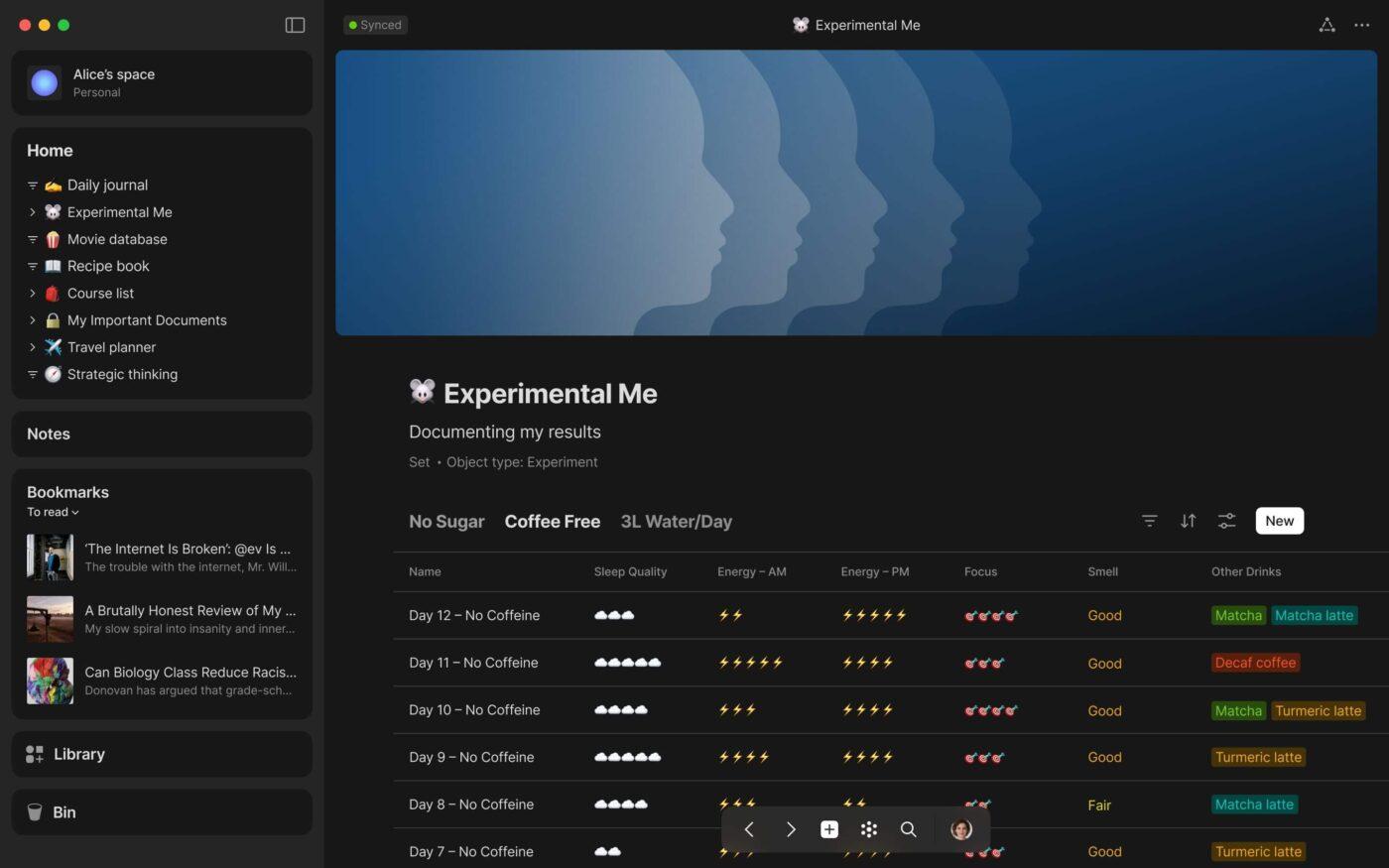
Feature #3: No-code design
Anytype offers a no-code creation experience, empowering users to compose anything they imagine visually. The block-based editor, database, templates, and widgets grant you absolute freedom to customize your workspace the way you like without writing a line of code.
Feature #4: Database visualization
With Anytype, you visualize your database entries as relational graphs. Moreover, the interactive format makes it easier to manage, demonstrate, and interpret data relationships effectively, as well as connect ideas across complex datasets and projects.
➡️ Read More: Free Task Management Templates in ClickUp & Excel
Anytype pricing
- Explorer: Free
- Builder: $99/year
- Co–Creator: $299 for 3 years
- Business: Custom pricing
💡 Pro Tip: Developing a personal wiki centralizes everything, from complex business projects to personal endeavors. It turns your team’s knowledge into a powerful, organized asset. Think of it as your team’s brain, always accessible and available.
What Is Notion?
Notion is a versatile productivity and note-taking web app. It combines knowledge management, task management, and project planning in one platform.
Whether you’re an individual or a team, Notion helps you stay organized. Its customizable templates and seamless integration with other tools are another advantage.
Notion features
Unlike Anytype, Notion excels in real-time collaboration, cloud-based accessibility, and powerful integrations with tools like Slack, Google Drive, and Zapier.
With AI-powered assistance, advanced database filtering, and intuitive page linking, Notion makes creating structured, dynamic workflows for individuals and teams easy.
Here’s a list of the key features of Notion:
Feature #1: AI assistant
The integrated AI assistant from Notion helps draft content, summarize notes, and answer queries based on workspace data, offering a productivity boost. These features are useful when working on projects where content generation or refinement is crucial to the workflow.
Feature #2: Wikis
The best way to centralize professional or personal knowledge management on Notion is through the use of wikis. Notion allows you to create interconnected pages that make information accessible and navigable. These individual and business wikis establish a single source of truth, facilitating easy access to data.
Feature #3: Docs
Docs on Notion enable users to create a page and effectively communicate their ideas. It features a collaborative block-based editor where teams come together to exchange ideas, share feedback, and utilize AI to enhance content, making documentation easier.
Feature #4: Sites
Notion Sites allows users to publish any page as a website effortlessly. Whether you’re creating landing pages, sharing information publicly, or disseminating resources, Sites reduces reliance on external web hosting services.
The intuitive interface makes customization effortless, allowing users to design their sites without prior coding knowledge. With built-in analytics, you can effectively track engagement and optimize your content.
Notion pricing
- Free up to 10 users
- Plus: $12 per seat/month
- Business: $24 per seat/month
- Enterprise: Custom pricing
📮 ClickUp Insight: Only 7% of professionals depend on AI primarily for task management and organization. This could be because the tools are restricted to calendars, to-do lists, or email apps.
With ClickUp, the same AI powers your email or other communication workflows, calendar, tasks, and documentation. Ask, “What are my priorities today?”
ClickUp Brain will search across your workspace and inform you exactly what’s on your plate, prioritizing tasks based on their urgency and importance. Just like that, ClickUp consolidates 5+ apps for you within a single, super app!
Anytype vs. Notion: Features Compared
When comparing Anytype, Notion, or any promising alternative, weighing the features along with your unique needs is essential. Here is a detailed comparison of the key features:
Feature #1: Widgets
Widgets enhance productivity by providing direct access to essential information, features, or tools from the dashboard. Widgets also indicate the platform’s ability to adapt to your requirements.
Anytype offers customizable widgets that allow users to customize their workspace. These widgets provide quick access to notes, tasks, and other frequently used objects.
While Notion does not offer native widget support, users can embed third-party widgets using services like Indify or WidgetBox, which provide similar functionalities.
Winner: Anytype, since it provides native widget support for a truly tailored and customizable user experience. 🏆
📚 Also Read: How to Create a Dashboard in Notion
Feature #2: Calendar and time management
Anytype’s Calendar feature lets users manage and visualize their events within the application. You can view your schedule by day, week, month, or year, catering to your various planning requirements.
Similarly, Notion has a robust calendar that integrates with its database. This allows you to organize data or plan tasks along a timeline. Notion’s calendar also supports collaboration, allowing teams to manage their schedules effectively.
Winner: It’s a tie. Anytype and Notion both offer calendar functionality that facilitates effective task management and scheduling. 🤝
Feature #3: Web Clipper
Web Clipper is a tool that allows users to save web content directly into their workspace. This makes research and information gathering quick and easy.
Anytype rolled out its web clipper in version 0.39.0. Use it to clip content and organize all your clippings into relevant categories for effective personal knowledge management. The web clipper is available as a Chrome extension.
Notion also provides a web clipper extension for popular browsers. You may save articles, bookmarks, and other web content directly into your Notion workspace. The tagging functionality makes it easier to organize and retrieve web clippings.
Winner: It’s another tie. Both offer web clipper tools that make it easier to conduct research and organize content. 🤝
Feature #4: Data portability
Data portability enables users to export or transfer their data in various formats, providing them with greater control over their information.
Since Anytype focuses on data ownership, it grants users absolute control over exporting data in different formats. You can import data in various formats, including Markdown (MD) files, HTML, TXT, CSV, JSON, and Protobuf. As for data export, Anytype allows it in MD, JSON, and Protobuf formats.
Notion allows you to export data in PDF, HTML, MD, and CSV formats. However, the process is somewhat cumbersome, and certain content types may not export seamlessly. Several users have reported difficulties when migrating complex databases or linked content.
Winner: Anytype for its straightforward approach to data import/export, which provides greater control over information. 🏆
Feature #5: Security
Security is paramount if you’re dealing with highly confidential or sensitive information.
Anytype has security baked into its core with end-to-end encryption. Its local-first approach, evidenced by the offline mode, ensures that the data remains private and within the user’s control. Apart from offline access, Anytype relies on distributed backup nodes in a peer-to-peer network for data syncing. Such backup nodes decentralize the server, adding a layer of security.
Notion implements standard security measures and does not offer end-to-end encryption in its cloud services. Plus, all your data gets stored on the Notion servers, requiring you to trust their built-in security protocols. While Notion is a reputable note-taking app, the lack of control over your data is a concern for many.
Winner: Anytype, for its advanced security features, including end-to-end encryption and offline access, promises greater privacy and security. 🏆
Feature #6: Integrations
Anytype has focused on becoming a self-contained environment. As such, it does not currently support any integrations with external applications; however, plans and development pipelines envision API and plugin support. You could perform embeds, which is a workaround if you have to connect tools.
Notion offers extensive integrations that extend its capabilities beyond note-taking and knowledge management. Integrate Notion with Slack, Google Drive, Google Docs, Google Calendar, Trello, ClickUp, and several other tools for a unified workflow. Such an integrated workspace facilitates seamless data exchange and communication.
Winner: Notion, for supporting a variety of integrations that enhance tool versatility and workflow efficiency. 🏆
Feature #7: Templates
Anytype offers several customizable templates that enable users to set up notes, projects, and databases tailored to their unique requirements.
Similarly, Notion templates serve as starting points, allowing users to modify them to their requirements. However, Notion truly stands out due to the variety of templates available. Whether you’re managing a project, taking personal notes, creating content, or collaborating with your team, Notion has a template for every application.
Winner: Notion, for its extensive library of templates, including a community-driven template library. 🏆
➡️ Read More: Free Daily Planner Templates in Word, Excel, & ClickUp
Anytype vs. Notion on Reddit
We took the Anytype vs. Notion debate to Reddit to understand users’ feelings about both platforms.
The Reddit user u/Koko_chu perfectly summarizes the difference between the two below:
Many who prefer Anytype do so because of its privacy and security features, as well as offline access. Notion users like the platform’s ease of use and stability.
🧠 Fun Fact: Gartner analysts expect every person in a developed country will have an interaction with at least one AI instance daily by 2030.
Meet ClickUp—The Best Anytype and Notion Alternative
Although Anytype and Notion deliver powerful features for knowledge management, they are not immune to limitations.
For example, Anytype lacks real-time collaboration, while Notion’s security and data ownership raise concerns for some.
This is why ClickUp, the workld’s first converged AI workspace, is a powerful Anytype and Notion alternative.
ClickUp combines the best features of Anytype and Notion and then some. As a contextual AI work tool, ClickUp provides a platform that centralizes knowledge management, project management, real-time communication, team collaboration, plus automations, agents, and contextual AI.
📚 Also Read: ClickUp Vs. Notion: The Best Docs Tool to Choose
Here’s where ClickUp stands out:
ClickUp’s One Up #1: ClickUp Chat
Forget about switching between tools for discussions and project management tools for tasks. ClickUp’s Chat enables teams to communicate in real time, keeping conversations organized by project or topic.
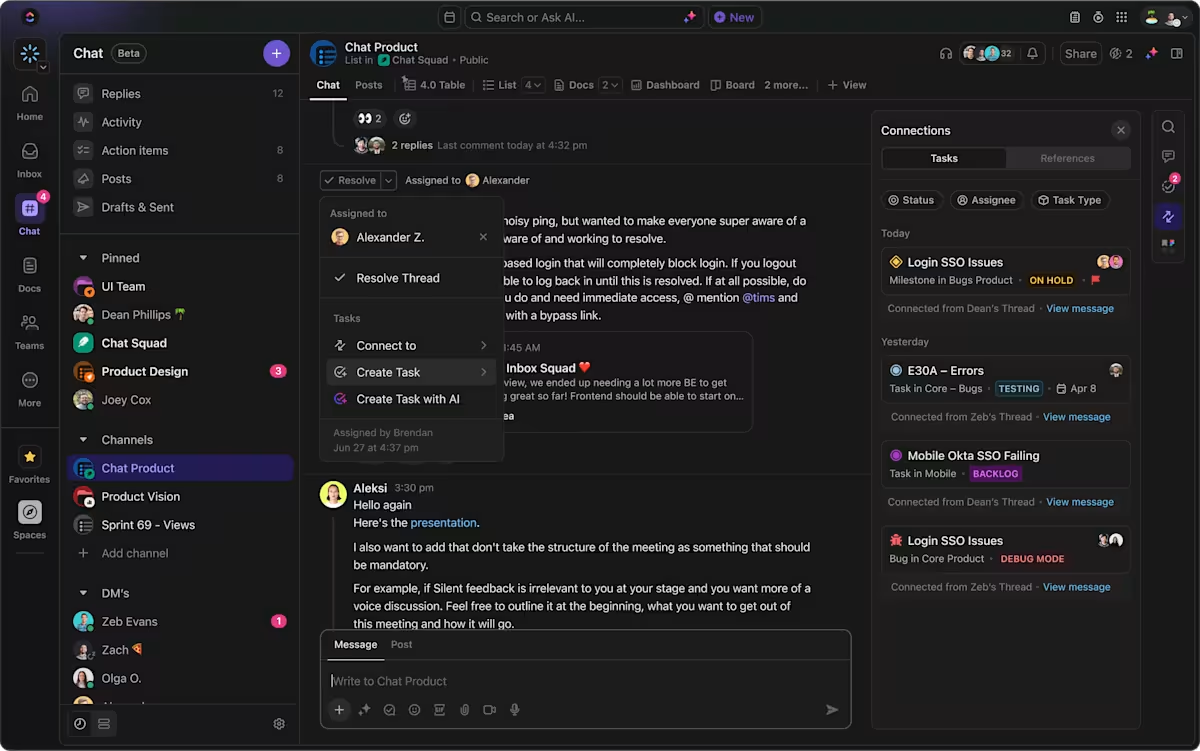
Plus, with ClickUp’s Assign Comments feature, discussions don’t get lost—turn any comment into an action item with a due date, so nothing is missed.
📌 You must be wondering what makes ClickUp truly unique?
- Chat, but with context—discussions stay linked to tasks
- Actionable conversations—turn messages into to-dos
- No message limits—unlike Slack’s free plan, ClickUp lets you keep all your chat history
Here’s what Thomas Clifford, Product Manager at TravelLocal, had to say about using ClickUp:
ClickUp’s One Up #2: ClickUp Docs
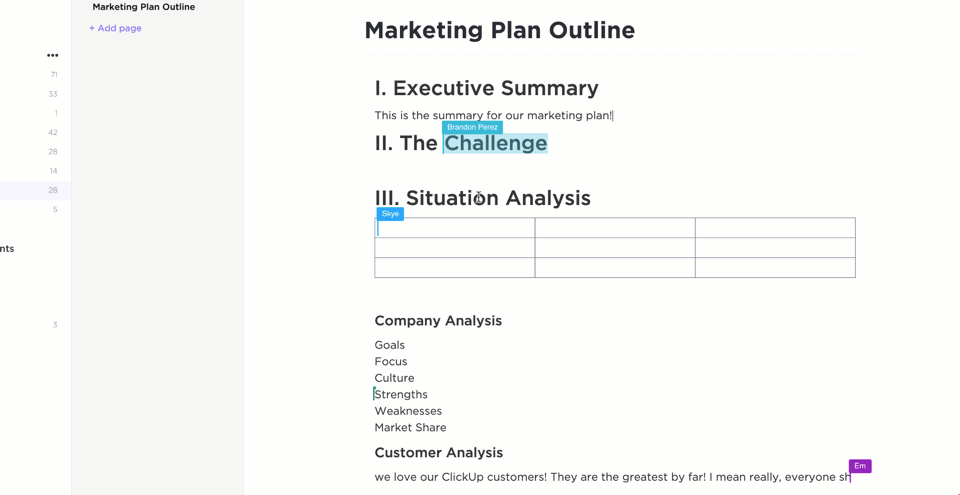
ClickUp Docs is a fully integrated document hub that enables users to create, edit, and collaborate on documents in real time. The intuitive interface of the Docs editor offers familiarity with document processing platforms like Google Docs or Microsoft Word.
Besides textual content, Docs supports rich media like photos, videos, GIFs, and more. Whether creating a personal wiki or maintaining an interactive checklist, ClickUp Docs supports different formats. You can easily export these documents as PDF, HTML, or MD and get them printed.
ClickUp’s One Up #3: ClickUp Brain and Brain MAX
Benefit from the power of AI agents and multiple external AI models (like ChatGPT, Gemini, Claude, and more) that have the FULL context of your broader work ecosystem, including connected apps, and the assurance of enterprise-grade privacy.
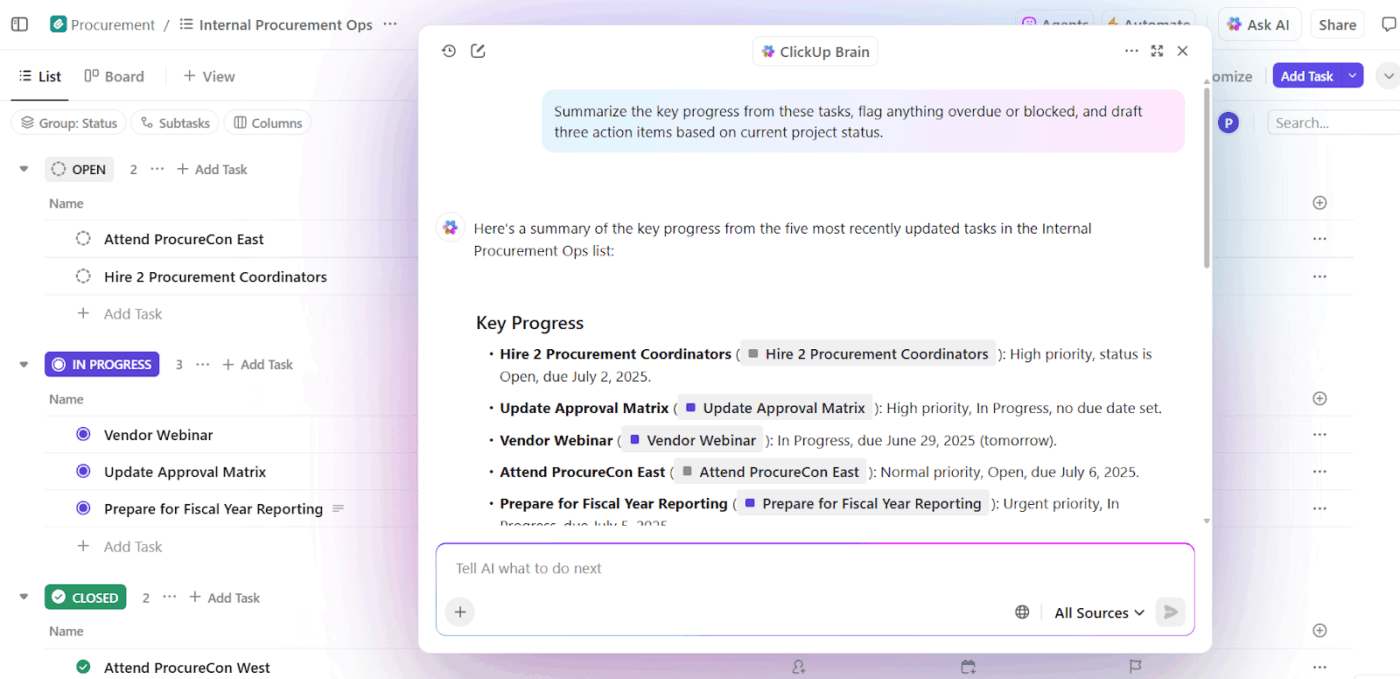
And that’s exactly what ClickUp Brain offers. As an AI-powered neural network that seamlessly connects tasks, documents, people, and your company’s entire knowledge system, making work smarter and more efficient. The’s the power of an ambient work AI.
- Use voice to create tasks, summarize meetings, automate follow-ups, or generate images with Talk to text
- Search and retrieve information from any connected app, then act on it with AI
- Chat with the latest AI models like ChatGPT, Claude, and Gemini for coding, writing, complex reasoning, and more, without switching between apps
- Generate images, tasks, messages, projects, and more—with zero prompt engineering or manual input

Work AI becomes more accessible with ClickUp Brain MAX, a dedicated desktop AI companion that unifies AI, search, and automation across every work app. This ushers in a new era of contextual AI and ends the chaos of disconnected AI tools. Because you only need one, and it has full awareness if your tasks.
🧠 Fun Fact: 21% of people believe that AI tools will help them bring their A-game on!
ClickUp’s One Up #4: ClickUp Tasks
Imagine a task management system that anticipates your needs rather than adding to your chaos. ClickUp Tasks aims to do just that by smoothing out the typical friction points. Instead of chasing updates, this feature delivers directly to your workspace.
Identify potential project roadblocks well in advance or instantly locate a crucial task, regardless of where it’s filed.
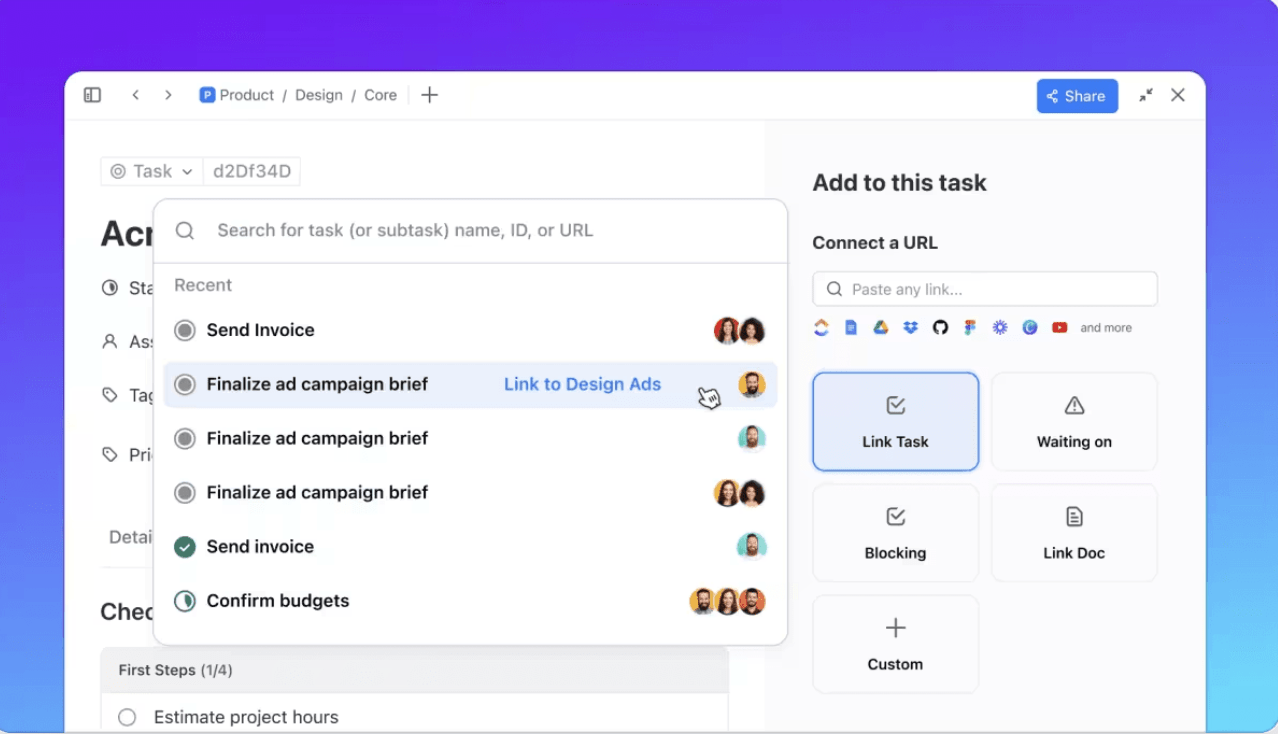
Beyond the basics, ClickUp Tasks can connect all your work in one space. Think of it as a central hub where your documents, whiteboards, and conversations naturally link to your tasks. Customization plays a big role, allowing you to tailor fields and workflows to your team’s needs.
Here’s a quick video rundown of task types on ClickUp:
Because automation handles the repetitive stuff, you can focus on the work that truly matters. With features like AI-powered summaries and progress tracking with ClickUp Brain, ClickUp Tasks aims to provide insights, helping you make more informed decisions.
ClickUp’s One Up #5: ClickUp Integrations

ClickUp Integrations connects with over 1,000 third-party apps, providing you with the flexibility to select the additional functionalities and features you need. Whether you use GitHub for development, Google Drive for file storage, or Slack for communication, ClickUp weaves everything together.
Moreover, native integrations and API access promise a more connected experience as you sync data across platforms, automate repetitive tasks, and work seamlessly across your favorite apps!
Try ClickUp—The Best Alternative to Anytype and Notion
Both Anytype and Notion have their strengths and weaknesses. Anytype is more aligned with personal knowledge management, focusing on privacy, security, and offline access.
On the other hand, Notion excels at collaboration, project documentation, and database-driven organization. One may think that Anytype is the best Notion alternative in terms of security, while others may consider Notion far superior due to its collaborative features. The decision eventually boils down to your requirements.
However, if you want the best of both worlds, ClickUp is the ultimate alternative. It offers end-to-end security with various measures to maintain SOC 2, GDPR, and HIPAA compliance. At the same time, it provides a range of collaborative features that help you organize ideas and connect with those who matter.
ClickUp provides a powerful productivity boost for knowledge management, enabling you to work smarter, not harder. Sign up for ClickUp and experience the difference!



